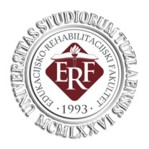PARENTS EDUCATION AND FUNCTIONING OF FAMILIES OF CHILDREN WITH INTELLECTUAL DISABILITIES
Keywords:
Family functioning, Parent's education, Children with intellectual disabilitiesAbstract
The terms functionality and dysfunctionality are used to define the "normality" of the family, referring to patterns of organizing the family process. The study aims to examine the relationship between parents' educational attainment and the functioning of families of children with intellectual disabilities. The sample consisted of parents of children with intellectual disabilities of elementary school age (N = 40), of whom 28 were parents (70.0%) with completed primary school and 12 parents (30.0%) with completed high school. The Beavers Family Function Model was used to test family functioning, and the Family Inventory Scale of Family Inventory Version II was applied. The results of the study showed that of the 28 families with primary education parents, 7 (25.0) are functional and 21 (75.0) dysfunctional families. Of the families where parents indicated that they had a high school, 8 (66.6) were functional and 4 (33.3) dysfunctional families. Both groups achieve lower than average scores on all family dimensions, which means that they exhibit good competencies across all dimensions. The results of correlation showed that there is a weak negative correlation (r = -0.323; p = 0.045) that is, the lower the level of education, the greater the dysfunction in families. The obtained results should be taken with caution, since the parents' sub-samples are uneven and small concerning their education, and only one parent from the family participated in the research. To obtain a more complete picture of the functioning of families of children with intellectual disabilities, the identified shortcomings need to be addressed in future research.
Downloads
Downloads
Published
How to Cite
Issue
Section
License

This work is licensed under a Creative Commons Attribution-NonCommercial-NoDerivatives 4.0 International License.







